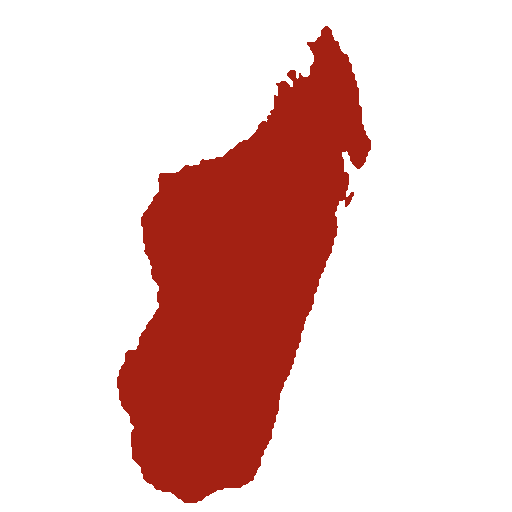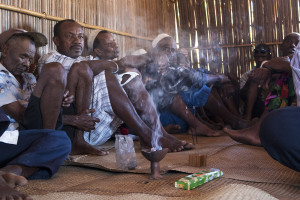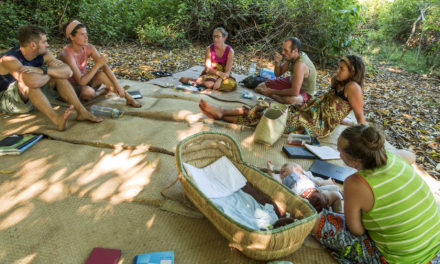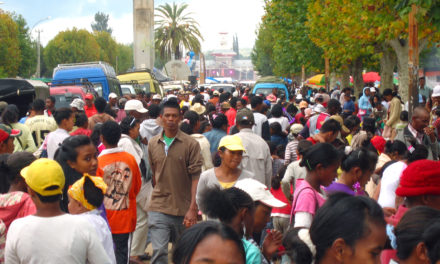T hree and a half years ago we arrived on Nosy Mitsio to bring the good news to a place that had never heard about Jesus. It has been a journey full of joys and challenges. When we arrived, we stayed in a tiny leaking rice storage hut and had no toilet or private bathing area, until our house was built several months later. We acquired materials from the mainland and made endless trips by sea to build and furnish four other homes for our team members to live in, all of this accomplished using a dialect we hadn’t learned yet. Adam made the three day journey by sea through a severe storm to get our team boat from where it was docked at the northern tip of Madagascar down to our island home.
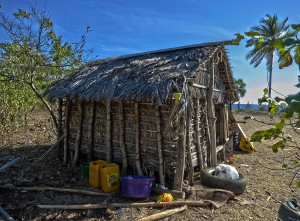
The storage hut that we moved into (our “temporary home”) when we first arrived on Nosy Mitsio in August 2013.
We learned how to live in this harsh environment, in a place with no market. We learned how to store food that would otherwise be eaten by rats and bugs. We also learned what it meant to wait on the winds and the waves as our only way on and off the island. We prepared everything for our team members’ arrival on the island. Then we trained them for two years in language learning, cultural adaptation, and missions strategy. As a team, we’ve worked in the local school, begun a medical ministry, and translated a Bible story set that we’ve been sharing in our village communities.

One of our first boat rides to/from Nosy Mitsio – caught in a small storm and had to turn back home!
Those of you who’ve followed our stories over the years may remember the details of these joys and struggles. There was more than one time throughout the years when I wondered what God was doing and if it was time for us to move elsewhere. We were driven to the point of exhaustion and yet still we pressed on. Sometimes people ask what’s been the hardest part about living here. You may think it’s that we don’t have running water or that I wash our sons’ diapers by hand or that we eat beans and rice twice a day nearly every day.
B ut the truth is that none of that – the challenging environment, the primitive lifestyle, or the physical labor of living life here – none of that has compared with being face-to-face with the oppressive spirits that reign over the people. For years I knew it was here but I wasn’t ready to see it. All of my energy was taken up with living and with training our team. But we knew the day would come, that it would be inevitable as we became more accustomed to the life and the people here, that one day we would be faced undeniably with the deepest aspects of their worldview – with the spirits they worship, believing them to be their ancestors. As we began to craft Bible stories, our conversations went deeper into these spiritual topics.
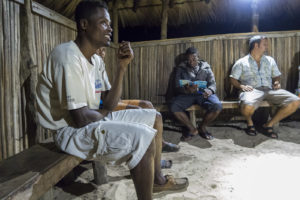
One of the Bible story discussions in our own village. After working through just a few stories, some people moved away and others’ interest seems to have fizzled out.
Several of the villages have struggled to get past the first few Bible stories. However, the village just down the beach from us was regularly meeting three times a week to hear the Bible stories and they were moving through them steadily. One man, Bostoany, and one woman, Maman’Jordany, took the lead and gathered the people together, read the stories, and asked the discussion questions. Both of them many times expressed how much they enjoyed the stories. Maman’Jordany told me that she really wanted to follow the stories, and that if she could she would have the village meet every night for storying. Many times she expressed in front of everyone how she’d been asking God for his Spirit to come into her and into the village. The last story we did together was of John baptizing Jesus. Then, due to our team’s training program, we left for the mainland.
U pon returning to Nosy Mitsio I looked for Maman’Jordany but didn’t find her. I asked about her and they told me that while we were gone she became very sick and was possessed by a spirit. She left for another village where they were still doing rituals on her until they appease the spirit and she becomes better again. In local belief, once a spirit possesses you, it will never leave again. I was so grieved and I felt like I had been stabbed in the heart. I wonder even now with tears, “How can a woman who had been asking for the spirit of God receive an evil spirit instead?” I’ve seen and talked with Maman’Jordany since then, but she’s shown little of her previous interest in the Bible stories.
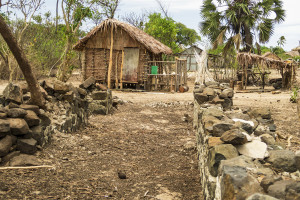
The “old lady”s newly built home in our village (background), next to the ruins of the old royal household (foreground).
An older woman has recently moved to our village because the ancestors gave her a dream that she’s supposed to be near the sacred ancestral stones here. She’s been working hard every day to clear out and clean up the area of the Antakarana royal ancestral ruins. She doesn’t tell anyone her name and nobody knows who she’s related to. They think that because she’s never had any family visit her here on Nosy Mitsio, that she must be in exile from the mainland. The common belief is that she must have cursed and possibly killed someone in the past, that maybe she’s a witch. People are very scared of her and almost nobody visits her.
This has caused lots of strife with relationships in our village. Two households are no longer talking to each other (and there’s only three households in our village besides us). One day our head-woman and a young lady were in a screaming fight about this old woman. Immediately afterwards, our head-woman became sick and possessed by a spirit. Barking and grunting sounds were coming from her house as more and more people started to show up to perform the standard rituals. This particular spirit was very aggressive and didn’t want her to be near people at all.
We found out later that our head-woman has many spirits, more than three (which is considered to be a whole lot), and the recent spirit also announced that there would be still more coming to possess her soon. One of my good friends was relaying this info to me. I asked her if she has any spirits that possess her. She simply responded, “not yet.” She has little hope that she won’t also be possessed one day. This is the sort of fatalistic despair that underlines the Antakarana worldview, which also brings me close to despair for them.
Just last week, a team member’s friend in his village was also possessed by a spirit. Villagers had him pinned down as he was moaning and flailing around. Our colleague told them that if they wanted, he knew how to get the spirit to leave, but they just told him to be quiet. With great sorrow, he left their house and continued to pray.
T his is the heaviness we face constantly these days, the utter darkness that seems to surround us on all sides. This is how things are made right in their world: figure out what the ancestors want and do it consistently, or else pay the price – it could cost you your life. But this is not just something they do; it’s who they are. Their identity is directly tied to these spirits; they are the Antakarana. These are the stories and the images we’re leaving with as we begin our long furlough.
And yet as I pondered all the things I heard and saw around me recently: the sicknesses and spirit possessions, the domestic disputes, the land feuds, the frequent drunkenness, I remembered what it says in Isaiah 11:3, “He shall not judge by what his eyes see, or decide by what his ears hear.”
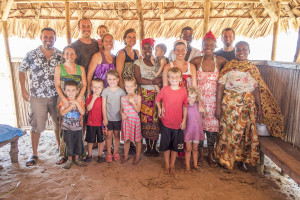
Our last picture as a team this term, together with several local people who’ve been a big help to our team. Our head-woman is in the front at the far right.
Somehow the joy in my spirit surfaced at that moment as I felt God confirm, “This is why you’re coming back.” After three and a half years of exhausting work, there’s still so much work to be done. And I’m completely okay with that. I remember when I sometimes wondered during the last few years what the point of it all was. But I can clearly say now that I’m glad we’ve endured. Because we’re just now getting to the part that matters. For years, we’ve lived here among the people day in and day out, adjusting to the external aspects of life and culture – the first step in reaching an unreached people group. But now that we’re rubbing up against the deepest parts of their spiritual identity, we’re now ready to confront it with the truths of the Gospel, to give the Antakarana the opportunity to find their true identity in Jesus. This is what we’ve been working toward.
A lthough this season is coming to a close, it’s brought us to the next one, where we have the opportunity to challenge the Antakarana worldview at a deep level – just as Jesus challenged the people around him everywhere he went. Romans 10:14 says,
When it comes to proclaiming the truth, we cannot slack in this area. In order to challenge the Antakarana worldview effectively, we must continue to learn the best way to communicate the truth in such a way that they can hear and understand it. For example, if we tell people that they need to trust in the Creator God, they wholeheartedly agree. They say they trust God in that they trust their ancestors, to whom the Creator God gave his power. Yet they believe their ancestors force themselves upon them, causing sickness, bringing curses, and even madness. If they say this is trusting God, then it’s a very different God than the one we know in Jesus. We need to go deeper in our understanding of the Antakarana and deeper in our communication of the truth. Paul is a great example of this. He usually knew his audiences well: their languages, beliefs, customs, philosophies, even their poetry – and all of this informed his communication of Christ.
As Paul states throughout all of Romans, our walk with Christ begins in faith. Faith is defined as, “complete trust or confidence in someone or something.” My faith in this mission has been tested many times over the past few years. During the more recent trip off the island, I was reminded again of how through faith we’re made right with God:
I think God must have been preparing me for what I would find when I got back to Nosy Mitsio. That despite what my eyes would see and my ears would hear, my complete trust and confidence in God would fill me with a hope for what’s to come. That against all odds, when the darkness surrounds us and evil spirits are claiming people left and right, that one day soon, “the earth will be filled with the knowledge of the glory of the Lord, as the waters cover the sea.” (Habakkuk 2:14) And as the waters flow and seep into the dark cracks and crevices far below, may God’s knowledge also fill the darkness here on Nosy Mitsio and seep into the cracks of hardened hearts.
In Christ,
Lora
P.S. Very soon, we’ll be back visiting many of you in the US! We’ve had some recent drop in financial support and we’ll be having more expenses soon with travel to the US and within the US, so we’d love for you to pray and ask God if he’d have you join our work through financial support at this time. Both regular monthly gifts and one-time gifts are a big help for us to continue the ministry we do among the Antakarana people of Madagascar! For more information on giving, including a look at our budget, please visit our donation page.
Donate to the Mission
If you would like to be a part of the work the Willards are doing in Madagascar,
you can give a tax-deductible gift today.
